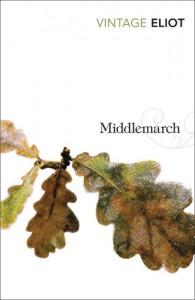1
Followers
2
Following
The Classics Companion
I have a (small) obsession with books and tv shows. Proud geek.
Middlemarch (Vintage Classics)
 I must admit, I haven't read a Victorian novel in such a long time. This was the first in a long list of Victorian novels that I want to read soon (hopefully before Christmas). Middlemarch is a long, rambling story of a typical provincial town, with the typical marriages and deaths and scandals. People describe it as a book about the whole of society: the rich, the poor, the ladies, the gentlemen, the farmers, the bankers, the bachelors, all rolled into one. It provides a lovely oversight of Victorian towns, and Eliot creates this by intertwining three threads of plot: the change in Dorothea from a girl fascinated by knowledge to the lonely Mrs Casaubon, the fall of Lydgate due to the gossip of society, and finally the doomed love between Mary and Fred, that cannot happen because of Fred's hideously awful attempts at keeping money.
I must admit, I haven't read a Victorian novel in such a long time. This was the first in a long list of Victorian novels that I want to read soon (hopefully before Christmas). Middlemarch is a long, rambling story of a typical provincial town, with the typical marriages and deaths and scandals. People describe it as a book about the whole of society: the rich, the poor, the ladies, the gentlemen, the farmers, the bankers, the bachelors, all rolled into one. It provides a lovely oversight of Victorian towns, and Eliot creates this by intertwining three threads of plot: the change in Dorothea from a girl fascinated by knowledge to the lonely Mrs Casaubon, the fall of Lydgate due to the gossip of society, and finally the doomed love between Mary and Fred, that cannot happen because of Fred's hideously awful attempts at keeping money.If you don't know already, George Eliot is a pseudonym for Mary Anne Evans. She simply wouldn't have gotten published if she retained her actual name, hence it was published under a male pseudonym. This was also used by Jane Austen and all three Bronte sisters. I think the fact it's written by a women is painfully obvious, but adds a nice, pleasant feeling to the read. If you think of Pride and Prejudice, it's a decent length book, but when you think about it, doesn't have much substantial plot, apart from the occasional marriage and minor downfall of characters. This is very much the same with Middlemarch. I'm not saying this is a bad thing at all, it allowed Eliot to explore society through everyday life. She used the connections between people and the surrounding historical contexts to highlight how society really works.
I said that it was a pleasant novel, but there is the undertones of the harsh reality of society. You have Bulstrode's dark past, thrown light upon by Raffles dying talk. You see the harshness of marriage. Dorothea changes from a wonderful girl admiring a man due to his expanse of knowledge, to a widow accepting she will never marry again, and is restricted by her late husband to never marry the man she loves. It's painful, seeing characters evolve, but it's also builds a very clear picture of society. That's why you don't get frustrated with it's length (a whopping 880 pages), because each sub-plot is intertwined so wonderfully that you feel like the society is laid out on a platter, for you to see each microcosm of the impacts of events and personalities. It does lag in the middle, with nothing much happening. Nothing substantial ever happens. You have deaths, you have scandals, but these are almost swallowed up by a move to another sub-plot, or a long, rambling speech about a part of society. To that extent, it can be seen as weak, especially after reading plot-packed, more modern books.
Eliot also have the favourable help of hindsight. She wrote this between 1871 and 72, yet set from 1830-32. It allowed her to see the impacts of vast changes. It was set in pre-Reform England, but Eliot had the advantage of living in post-Reform England. You also see her narration pop through the plot. Occasionally, you see the usage of 'I', making Eliot almost an omniscient being. She knows what happens, she knows the characters pasts, and the future of society. We also hear about the death of King George IV, his successor, and the pathways being made in medical science, but also the want to stick to traditional ways. The wide expanse of characters allows for many different views on a lot of different events and themes, making it a very contextual novel, one that enlightens the Victorian period amazingly. It's ultimately a realist novel, but has elements of a modern novel we know today.
It's a long read, you have to put up with long rambling narration (the worst I've seen so far is in Les Miserables), but it paints a truly wonderful picture of society in the 1830s, and is so clever in it's weaving of plot threads, it's a truly enjoyable read, regardless of it's length. I do, wholeheartedly agree with Virginia Woolf's comment on it: 'the magnificent book that, with all its imperfections, is one of the few English novels written for grown-up people'.



